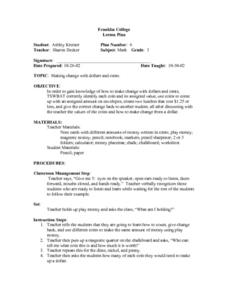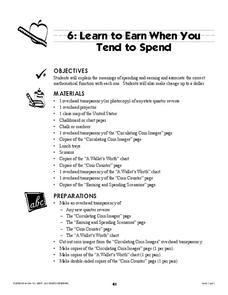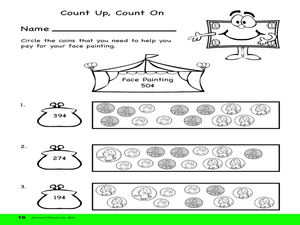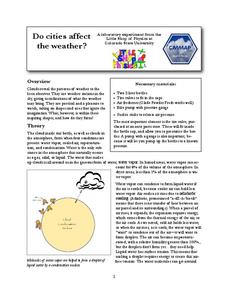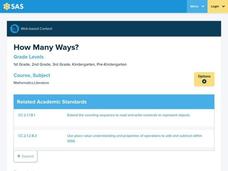Scholastic
Study Jams! Making Change
This dreamy resource has little ones computing the change on the purchase of an ice cream cone. Mia describes each step in two methods: subtraction of decimals and counting up from the sale price.
Curated OER
Ch-Ch-Ching Cafe: Play Restaurant Make Change
Fourth graders make change by participating in a role-play restaurant activity. For this making change lesson, 4th graders use their math skills to compare prices and compute bills in a role play restaurant activity.
Curated OER
Lesson Four - Making Change
Students practice making change. In this money lesson, students complete worksheets in which they find the amount of change they would receive from a dollar bill amount. Students go online and play games on this same concept.
Curated OER
Everyday Mathematics: Counting Up
In this counting up worksheet, students learn strategies to help them solve problems involving change. Students study a number grid and number line to help them count up to make change.
Curated OER
Making Change with Dollars anc Cents
Third graders increase their knowledge of how to make change with dollars and cents by correctly identifying coins along with their values and then using coins to make an assigned amount which will be written on envelopes. They then...
Curated OER
Changing It Up
How should a cashier stock a cash register with coins? Learners use mathematical modeling and expected value to determine how many rolls of coins of each type they should place in a cash register.
Curated OER
Making Change
Second graders explore how to incorporate a new type of technology, the cash register and/or a calculator, as a motivational tool for solving real life problems. They practice estimating money and counting back change from $20.00.
Curated OER
Counting Change
In this counting change worksheet, students read information about making and counting change. Students then solve 4 problems that require them to draw coins for the correct amount of change in different buying situations.
Illustrative Mathematics
Selling Computers
A quick activity to test your learners' knowledge of percent increase. When an electronic store needs a 30% increase in computer sales, your mathematicians must calculate how many computers they need to sell next month.
Illustrative Mathematics
How Many Cells Are in the Human Body?
Investigating the large numbers of science is the task in a simple but deep activity. Given a one-sentence problem set-up and some basic assumptions, the class sets off on an open-ended investigation that really gives some...
Curated OER
Up and Atom
"Up and Atom" is a mini-unit introducing middle-schoolers to the wonders of elements. Participants draw atom models, examine the periodic table, compare samples of metals to nonmetals, identify unknown elements, and more! The beginning...
Curated OER
The Counting Caterpillar
A daily counting routine builds a caterpillar with 100 body segments (marked with symbols to indicate 2s, 5s, and 10s) by the 100th day of school. Provides structured repetition as part of the morning routine so that by 100th day,...
Curated OER
Learn to Earn When you Tend to Spend
Analyzing and understanding word problems is extremely important. Pupils learn that in money problems, earn usually means you add and spend usually means you subtract. They will solve a series of money-related word problems, label coins,...
Virginia Department of Education
Weather Patterns and Seasonal Changes
Get your class outside to observe their surroundings with a lesson highlighting weather patterns and seasonal changes. First, learners take a weather walk to survey how the weather affects animals, people, plants, and trees during...
CK-12 Foundation
Basic Counting Rules: Sandwich Shop
Young mathematicians make a tree diagram of all possibilities for sandwiches using an interactive. They learn how multiplication speeds up the process of finding the number of outcomes.
Curated OER
Math Lesson Plan : Finger Counting
Create a class of mathematics master. They practice addition to ten until they have mastered the skill. They use their hands to add numbers and eventually find the missing addend to make a sum of 10. They also subtract a single digit...
Curated OER
Counting Change and Changing Coins
Second graders demonstrate how to count change. In this consumer math lesson, 2nd graders read the book The Penny Pot and identify the value of coins. Students complete a worksheet to practice counting coins.
Curated OER
Making Change
In this making change worksheet, students read about how to make change, then determine the correct amount of change for 4 items when paid with a given amount.
Under the Dome
Penny Cube
Use volume to count your change. Pupils watch as a cube is filled with stacks of pennies and make an estimate on how many pennies are in the cube. The teacher provides additional information to the class members about the size of the...
Colorado State University
Do Cities Affect the Weather? (Making a Cloud in a Bottle)
The dynamics of a city can have a drastic effect on the weather. A hands-on lesson asks learners to build a model to illustrate how city pollution provides a nucleus for condensation. The greater the pollution, the greater chance for...
Curated OER
Estimation
Select items to purchase from a store, add up the total cost, then estimate the total cost! Kids count out the money needed to make the purchase and pay for the items. An excelent way to connect real life math and estimation!
Curated OER
Chemistry Review
In this chemistry review worksheet, students identify chemical changes, isotopes, ions, and chemical bonds. This worksheet has 32 multiple choice questions.
Curated OER
Common Sense Cookie Shop
First graders shop for a bag of cookies using toy money. In teams, they choose which variety to buy and decides which bills and coins are necessary to buy the bag of cookies and a cashier makes change. They tally the cookies purchased...
Pennsylvania Department of Education
How Many Ways?
Students estimate the amount of money they have in groups of pennies, nickels, and dimes. In this money lesson plan, students then count up the amounts they have and exchange money amounts.






